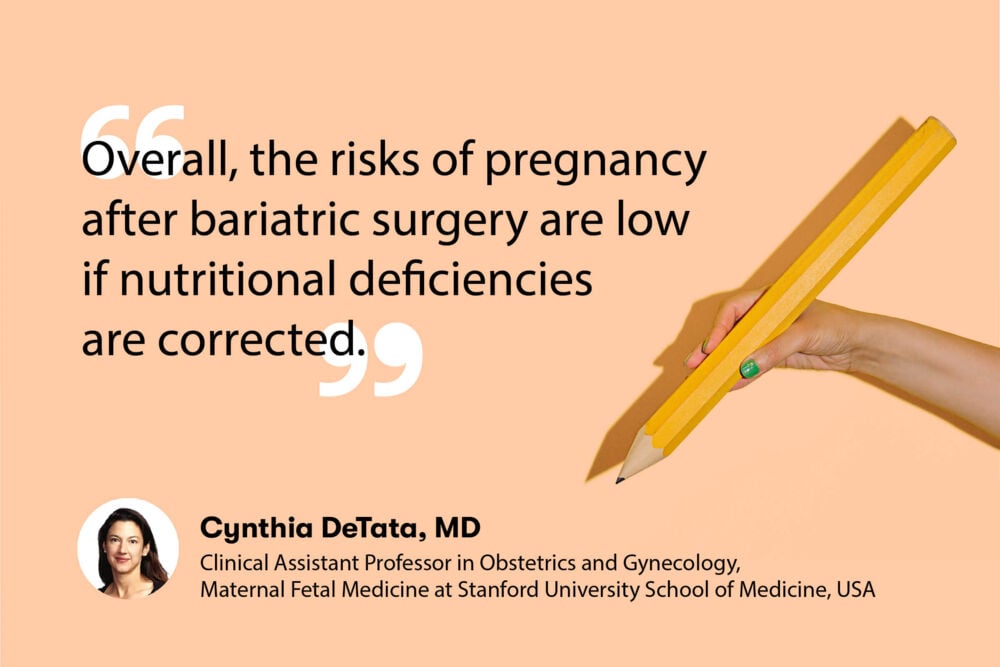You can have a safe and successful pregnancy after bariatric surgery. Cynthia DeTata — obstetrician at Stanford Health Care — answers the most important questions about pregnancy after weight-loss surgery.
-
Tracking cycle
-
Getting pregnant
-
Pregnancy
-
Help Center
-
Flo for Partners
-
Anonymous Mode
-
Flo app reviews
-
Flo Premium New
-
Secret Chats New
-
Symptom Checker New
-
Your cycle
-
Health 360°
-
Getting pregnant
-
Pregnancy
-
Being a mom
-
LGBTQ+
-
Quizzes
-
Ovulation calculator
-
hCG calculator
-
Pregnancy test calculator
-
Menstrual cycle calculator
-
Period calculator
-
Implantation calculator
-
Pregnancy weeks to months calculator
-
Pregnancy due date calculator
-
IVF and FET due date calculator
-
Due date calculator by ultrasound
-
Medical Affairs
-
Science & Research
-
Pass It On Project New
-
Privacy Portal
-
Press Center
-
Flo Accuracy
-
Careers
-
Contact Us
Pregnancy and Postpartum Recovery After Bariatric Surgery


Every piece of content at Flo Health adheres to the highest editorial standards for language, style, and medical accuracy. To learn what we do to deliver the best health and lifestyle insights to you, check out our content review principles.
Interview has been edited for clarity.
Which is safer: Pregnancy after weight-loss surgery or pregnancy and obesity?
According to Dr. DeTata, it depends on the degree of obesity and the type of weight-loss or bariatric surgery.
She says that obesity can lead to many problems with pregnancy, and the risk increases with the level of obesity, or BMI (body mass index).
“There are several different types of surgery for obesity. Some surgeries are linked to more nutritional deficiencies, which can complicate pregnancy. When talking to your doctor before surgery, please discuss your plans to have a baby so that you can learn about the pros and cons of each type of surgery,” says Dr. DeTata.
“One study done in Sweden compared women who had had bariatric surgery before pregnancy with women who did not. They found that the risk of birth defects of the baby was lower in women who had bariatric surgery.”
What are the risks of obesity in pregnancy?
Dr. DeTata names several risks obesity carries during pregnancy:
- Increased risk of sleep apnea
- Gestational diabetes
- Hypertension
- Preeclampsia
- Stroke
- Pulmonary embolism
Additionally, obese people have longer labors, and it is more difficult to monitor the baby during labor. There is also a higher chance of having a cesarean delivery.
“What’s more, obese people have an increased risk of complications after cesarean, such as wound infections or clots in the legs, compared to people who aren’t obese. They require early testing for gestational diabetes, careful monitoring of their blood pressure, and assessment for other medical problems related to obesity at the start of their pregnancy.”
There are also risks for the baby:
- Increased risk of miscarriage
- Neural tube defects
- Undiagnosed fetal anomalies due to impact on diagnostic testing
- Difficult delivery
- Growth problems
- Preterm birth
- Stillbirth
According to Dr. DeTata, losing weight before you conceive is the best way to prevent these problems.
What problems might occur during pregnancy after bariatric surgery?
Dr. DeTata says that pregnant people often have vitamin deficiencies, most commonly iron, vitamin B12, calcium, and folic acid. “If you are pregnant, see your health care provider right away for prenatal care and testing for any nutritional deficiencies,” Dr. DeTata advises.
You can have a pregnancy safely after bariatric surgery if you plan ahead and take steps to maximize your health before trying to get pregnant.
Dr. DeTata says that overall, the risks of pregnancy after bariatric surgery are low if nutritional deficiencies are corrected.
“There isn’t an increased risk of congenital anomalies or other poor outcomes after bariatric surgery in comparison to a group of obese people who didn’t have surgery, and outcomes might even be better than if the patient did not have bariatric surgery.”
Dr. DeTata says that there are several different types of surgery for obesity, and these surgeries might have different impacts on pregnancy. It’s important to share the records of your surgery with the health care provider who is caring for you during pregnancy.
Take a quiz
Find out what you can do with our Health Assistant
People who are obese who have had bariatric surgery require early testing for gestational diabetes, careful monitoring of their blood pressure, and assessment for other medical problems related to obesity at the start of their pregnancy.
According to Dr. DeTata, some patients who have had bariatric surgery are at risk for “dumping syndrome”— which is when food goes through the stomach into the intestines too rapidly. This leads to abnormal insulin production from the pancreas and can cause symptoms such as dizziness, nausea, flushing, palpitations, and possibly fainting after meals.
“This can be more pronounced in pregnancy. Your doctor might send you to consult with a dietician to find ways to eat that reduce the risk of dumping syndrome,” Dr. DeTata says.
There might also be a small increased risk of abdominal wall hernias and intestinal obstruction during pregnancy due to internal scarring from surgery.
Nausea, vomiting, and gastric reflux are very common during pregnancy, says Dr. DeTata. These symptoms might be worse for people who have had bariatric surgery, and they also further increase the risk of nutritional problems.
“Continued monitoring of the pregnant person to be sure that they are able to absorb enough nutrients to keep up their health and the health of her baby is important,” says Dr. DeTata. “Pregnant people need extra iron to help their babies make their little red blood cells and muscle cells. Even people who have not had bariatric surgery cannot always absorb enough iron through the food that they eat and may need extra iron, but people who have had bariatric surgery have a more difficult time absorbing iron and other nutrients. They may need additional folic acid, calcium, vitamin D, vitamin B12, and thiamine as well.”
Dr. DeTata also says that IV iron or B12 injections may be necessary for people who can’t cannot absorb enough of these nutrients through their stomachs.
Does having bariatric surgery affect labor and delivery?
Many people wonder if they might need a cesarean delivery after weight-loss surgery. Dr. DeTata says that labor and delivery are unchanged after having bariatric surgery, and the reasons for cesarean delivery are unchanged.
“Many people have excess skin from losing weight so rapidly after their surgery and often choose to have tummy tucks. The scarring from cosmetic surgeries can make a pregnancy more uncomfortable, but it won’t affect delivery. Losing weight before pregnancy reduces the risk of complications that might lead to a cesarean,” Dr. DeTata explains.
Labor and delivery are unchanged after having bariatric surgery, and the reasons for cesarean delivery are unchanged.
Postpartum care after bariatric surgery
Dr. DeTata says that weight loss after delivery seems to occur at the same rate as in people who have not had bariatric surgery.
“It’s important for future health to try to get back to pre-pregnancy weight after delivery. Eating a healthy diet and getting some exercise after delivery is very important but can be difficult with the demands of taking care of a baby.”
Does bariatric surgery cause problems with breastfeeding?
According to Dr. DeTata, breastfeeding is the healthiest way to feed your baby, and has many health benefits for a breastfeeding person as well:
“Breastfeeding can help you lose weight faster, reduce future risk of diabetes, and reduce the risk of some cancers. Did you know that breastfeeding uses up to 500 extra calories per day? That’s as much as running 5 miles!”
She also mentions that breastfed babies have a reduced risk of future obesity as well.
According to Dr. DeTata, if a breastfeeding person is deficient in B12 or iron, they may not have enough B12 in their milk, and the baby may also become deficient. She says that anyone who’s breastfeeding needs to continue their prenatal vitamins and iron supplements, and both they and their baby need to be monitored to see if any other supplements are needed.

Dr. DeTata says that rapid weight loss can cause changes in the shape of your breasts and your nipples, and these changes can sometimes make it difficult for babies to latch on to breastfeed well. Some people have cosmetic breast surgery after their weight loss, which sometimes damages nerves or milk ducts. The changes breast surgery can cause can lead to insufficient milk production, blocked milk ducts, and infection.
Dr. DeTata advises having a lactation consultant or knowledgeable health care worker observe and offer helpful advice to be sure breastfeeding gets off to a good start.
Birth control after delivery
Dr. DeTata says that it’s best to wait at least 18 months after delivery of one baby to the delivery of the next to get back into shape, heal adequately from delivery, and reduce the likelihood of nutritional deficiencies.
“Some people might not be thinking about sex immediately after delivery when their health care provider asks them about contraception, but it’s important to think about. Surprise pregnancies in the year after having a baby are common,” says Dr. DeTata.
She also says that people who have had bariatric surgery may not completely absorb oral contraceptives, so non-oral forms of contraception such as an IUD, injection, ring, pill, patch, or implant might be better.
Estrogen in contraceptives will not harm a breastfeeding baby, but it might cause decreased milk production. Contraceptives that don’t contain estrogen are a better choice while breastfeeding, Dr. DeTata says.
“Some contraceptives are less effective in people who weigh over 154 lb., or 70 kg. Talk to your health care provider to find out which form of contraception is the best for you.”


Hey, I'm Anique
I started using Flo app to track my period and ovulation because we wanted to have a baby.


The Flo app helped me learn about my body and spot ovulation signs during our conception journey.


I vividly
remember the day
that we switched
Flo into
Pregnancy Mode — it was
such a special
moment.
Real stories, real results
Learn how the Flo app became an amazing cheerleader for us on our conception journey.






